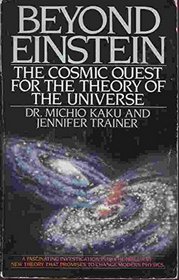For me this book gave me the feeling of learning something without me really learning anything.
Do you remember in maybe junior high when a science teacher taught you that if there were twins, and one of them went on a spaceship going real fast for a long trip, when they came back the twin left on Earth would be much older than the twin that went on the trip? And that that was relativity? And then some kids would think they understood relativity because they had been told that factoid?
That's what I feel like having read this. Kaku hits all the big points pretty well, without any involved math, but I don't feel like he really took me along for the ride. I learned that Maxwell realized magnetism and electricity were the same force, and that he realized that disturbances between magnetic fields and electrical fields perfectly predicted and described the path and speed of light, but not how/why. And so on with the strong nuclear force, the weak nuclear force, and now gravity joining up with string theory.
Kaku's at a disadvantage, admittedly, because Brian Greene's books are the yardstick against which I measure explanations of relativistic/quantum/string theory discussions of physics, and they may be the best in the world.
Also, this book was written in 1987, updated in 1995. A lot of stuff has changed, I'm pretty sure.
OK - one thing I learned. The weak nuclear force only works on very short distances - the thickness of a few protons and neutrons. That's why higher-number elements are unstable, and don't occur in nature. Up after about uranium or plutonium, there are too many protons and neutrons in the nucleus for the nucleus to hold on to them all - they're too far away from the 'center of the force' - like moons that are too distant from the center of gravity of a planet to be kept in orbit.
Do you remember in maybe junior high when a science teacher taught you that if there were twins, and one of them went on a spaceship going real fast for a long trip, when they came back the twin left on Earth would be much older than the twin that went on the trip? And that that was relativity? And then some kids would think they understood relativity because they had been told that factoid?
That's what I feel like having read this. Kaku hits all the big points pretty well, without any involved math, but I don't feel like he really took me along for the ride. I learned that Maxwell realized magnetism and electricity were the same force, and that he realized that disturbances between magnetic fields and electrical fields perfectly predicted and described the path and speed of light, but not how/why. And so on with the strong nuclear force, the weak nuclear force, and now gravity joining up with string theory.
Kaku's at a disadvantage, admittedly, because Brian Greene's books are the yardstick against which I measure explanations of relativistic/quantum/string theory discussions of physics, and they may be the best in the world.
Also, this book was written in 1987, updated in 1995. A lot of stuff has changed, I'm pretty sure.
OK - one thing I learned. The weak nuclear force only works on very short distances - the thickness of a few protons and neutrons. That's why higher-number elements are unstable, and don't occur in nature. Up after about uranium or plutonium, there are too many protons and neutrons in the nucleus for the nucleus to hold on to them all - they're too far away from the 'center of the force' - like moons that are too distant from the center of gravity of a planet to be kept in orbit.




